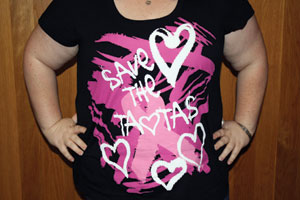T-shirts raise awareness, eyebrows
Araina Edwards
The Signal
Numerous organizations like the Keep a Breast Foundation and the Testicular Cancer Society are increasingly using creative, yet controversial, messages to reach and educate young men and women about cancer.
Such cancer awareness slogans aimed at youth education and prevention are stirring up controversy as some question the age-appropriateness of some of the messages. Some schools have even prevented students from wearing such apparel that contain seemingly “inappropriate” messages.
Terri Cook, La Porte Independent School District’s public information officer and director of public relations, explained that the district had encountered issues with some of the breast cancer awareness wristbands. Schools received reports from students that some of the wristband slogans were offensive. In response to such reports, school administrators have requested that students turn their wristbands inside out.
“Parents and students have been supportive and don’t want to offend anyone,” Cook said. “I would suggest using an alternative option to demonstrate support for the cause.”
Another local school district, Pasadena ISD, has a standardized dress code that prevents shirts with any type of logo but has allowed wristbands thus far. In fact, many of the schools in the district are familiar with the “save the ta-tas” brand of wristbands.
“Bracelets –‘ta-tas’ brand- are generally allowed as long as they do not cause a distraction,” said Candace Ahlfinger, associate superintendent of communications and community relations.
The Keep a Breast Foundation aims to educate youth about the hereditary and environmental factors that could lead to cancer and uses the phrase “I love boobies” to reach young adults. The foundation’s PR and marketing manager Kimmy McAtee explains that the organization’s “I love boobies” slogan is a conversation starter, even if some believe it is inappropriate.
“‘I love boobies’ opens up a conversation for young people and we are excited about that opportunity,” McAtee said. “Pink ribbons were not starting the conversation anymore and we needed to talk to young people in a way that resonated with them.”
Mike Craycraft, cancer survivor and founder of the Testicular Cancer Society, explains that his organization seeks to educate youth, especially young men, about the importance of awareness and prevention regarding testicular cancer. Craycraft believes that the organization’s phrase “check your balls” has been effective in its campaign to reach young men.
“For our particular organization, ‘check your balls’ is going to be more appealing to young men than saying ‘self-examine your testicles’ and since testicular cancer is the most common cancer in men 15-35 years of age, we need to appeal to that audience,” Craycraft said.
However, Craycraft does warn that some people might be hooked to a favorite saying or brand, and not necessarily the message. His sentiments are also shared with Gary Whitman, professor of radiology and director of the mobile mammography program at MD Anderson Cancer Center, who is also concerned that some awareness messages might get lost in translation.
“Encourage awareness with a good message that people will respond to and act upon,” Whitman said, “but companies need to be careful because messages may not reach intended audience.”
In fact, Chelsea DeHoyos, a 14-year-old high school freshman who owns both “I love boobies” and “I love balls” bracelets, admits that she did not necessarily buy the bracelet to support testicular cancer awareness.
“I bought the ‘I love boobies’ bracelet because I was actually thinking about it [the cause], but I bought ‘I love balls’ just because I thought it was funny,” DeHoyos said.
Another high school student, 15-year-old sophomore Sumedha Rao, does not own any cancer awareness apparel but notices that some of her classmates are wearing awareness bracelets. Rao believes that the focus should be on supporting the cause, not the catchphrase.
“The slogan should not be the main focus,” Rao said. “If the slogan has to be there, it should be in a place where it is not the center of attention.”
Craycraft believes that while TCS’s “check your balls” campaign has been effective, there are other ways to raise cancer awareness without the use of controversial slogans.
For more information about the Keep a Breast Foundation, visit www.keep-a-breast.org. To find out more about the Testicular Cancer Society, visit www.testicularcancersociety.org.
Slideshow created by The Signal reporter Jessica Casarez.



[…] of breast cancer awareness T-shirts that some people think can be too racy or controversial. Click here to read Araina Edwards’ article about the […]
[…] Go here to read the rest: T-shirts raise awareness, eyebrows | The Signal […]